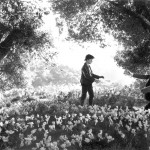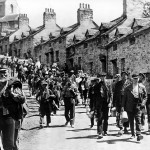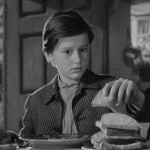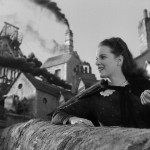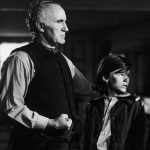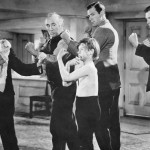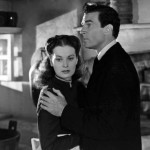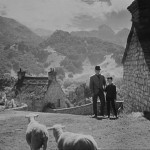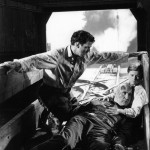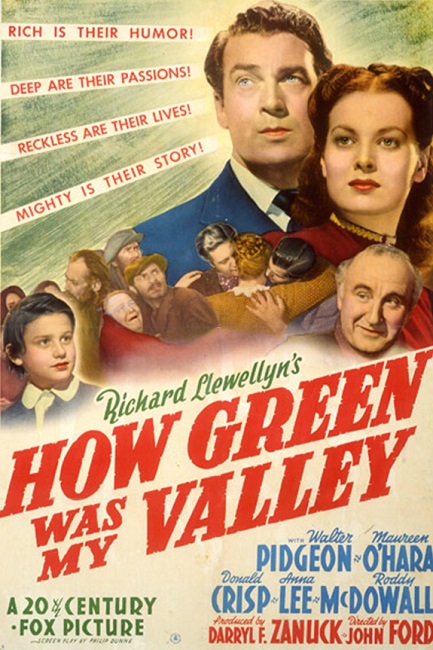
How Green Was My Valley – 1941
First, let me say – How Green was My Valley? Not very. The movie was black and white. This would have been better done in color. In fact, it was originally intended to be filmed in color on location in Wales, but World War II was in full swing, and they had to build a set on Fox Ranch in Malibu Canyon – which doesn’t really explain why it wasn’t filmed in color. A color film would have served the plot well.
The story is told through the recollections of a young man who, as a boy, who grew up in an impoverished mining town. At first everything is green and beautiful, but by the end of the film, the town is even poorer and blackened with mining spoil. The young boy, Huw Morgan, is played by a 12 year old Roddy McDowall. Of course, we all know that McDowall has been in many fine films as an adult, but it was interesting to see him as such a young actor. As child actors go, I thought he did a very good job.
His father Gwilym Morgan, played by Donald Crisp, was also a stand-out member of the cast. I watched a 1941 trailer for the film before watching the movie. The voice-over of the trailer called him “the tyrannical father.” But I thought he was anything but a tyrant. He was certainly stern and ruled his house as best he could, but he was also compassionate at the right times, and obviously wanted the best for his children. Crisp won the Academy Award for Best Supporting Actor for the role. Well done, Donald.
Huw had five older brothers and an older sister. The brothers were pretty non-descript. Their personalities and story arcs were pretty much all the same. But the sister Angharad Morgan, played by Maureen O’Hara had her own story line which carried a fair portion of the emotional content of the movie. She falls in love with the local priest, played by Walter Pidgeon. But he refuses her love, saying that as a priest, he has resigned himself to a life of poverty, and cannot ask her to share that life. So instead, she enters into a loveless marriage with a rich man. But even then, much of the characters’ emotions seemed to be played under the surface. Even when certain characters died in the mine, the family’s display of grief appeared to be short and almost unimportant. But then again, I suppose that being married to a miner means living with the knowledge that fatal disasters can happen at any time.
Over all, it was a pretty slow paced movie. However, there was one sequence in the film that was especially satisfying to watch. When Huw goes off to school, a bully beats him up, so his father gets a man in the village named Dai Bando, wonderfully played by Rhys Williams, to teach the boy to fight. The next time Huw is at school, he beats up the other kid. Unfortunately, the teacher sees him fighting and as punishment, he uses a cane to give Huw the beating of his life. After that treatment, Huw’s brothers offer to teach the teacher a lesson. Huw makes them promise not to because, after all, he had been told not to fight. Dai Bando, however never makes that promise, and the next day, he walks into the classroom and beats the teacher senseless in front of his students. The whole time he is speaking to the students, giving them a lesson in boxing. After the teacher is unconscious on the floor, Dai Bando addresses the class and says, “I’m afraid he will never make a boxer.” Like I said – a particularly satisfying sequence.
Another aspect of the film that is worthy of note is the singing. At first it seemed strange that a choir called the Welsh Singers were in the opening credits. Then in the film, the men of the village turned out to be a pitch perfect choir that would sing at the drop of a hat (or after a drop of whiskey). Not terribly realistic, but I thought that just because there were singing men in the script, Hollywood was just showing off by hiring a professional choir. At least they justified the musical towns-people by making the choral music part of the story.
The movie had an overwhelming sense of futility and depression, but that might have just been the subject matter. I mean, coal mining in those days was probably never a happy subject. Neither is child labor, strikes, mining accidents, and child abuse. At least they didn’t explore the subject of black lung. The only happy parts of the movie were those in which the Morgan family was together and united. But over the course of the film, the family slowly dissolved. Some of them moved away and others died. The only ones left in the end were the women and children. Of course, the whole film was a flash-back, so really the women are all gone as well, leaving Huw to leave the valley alone.
So, what am I saying? This wasn’t really a bad movie, but it was too slow paced and depressing for my tastes. Not exactly my kind of film.
Interesting note: The author of the original book actually wrote three sequels which follow the adventures of Huw as he moves to Argentina, of all places, and eventually back to the Valley.
